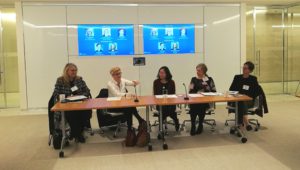 On January 9, 2019, the Washington State China Relations Council organized a panel discussion as part of the U.S.-China Women’s Leadership Forum. The discussion focused on professional growth advice for attorneys, and was led by three legal practitioners experienced in China/Asia and U.S. relations. Sara Sandford, a principal attorney at Garvey Schubert Barer, works with clients from around the world in all stages of establishing, acquiring, and operating businesses across borders. Amy Sommers was former chief representative of K&L Gates in Shanghai, advising multinational companies on their strategic initiatives. Yuping Wang, a partner at Davis Wright Tremaine, advises U.S. and foreign companies on their operations in China. WSCRC Board Directors Annamarie Larson, attorney at K&L Gates, and Ada Danelo, attorney at Garvey Schubert Barer, moderated the discussion.
On January 9, 2019, the Washington State China Relations Council organized a panel discussion as part of the U.S.-China Women’s Leadership Forum. The discussion focused on professional growth advice for attorneys, and was led by three legal practitioners experienced in China/Asia and U.S. relations. Sara Sandford, a principal attorney at Garvey Schubert Barer, works with clients from around the world in all stages of establishing, acquiring, and operating businesses across borders. Amy Sommers was former chief representative of K&L Gates in Shanghai, advising multinational companies on their strategic initiatives. Yuping Wang, a partner at Davis Wright Tremaine, advises U.S. and foreign companies on their operations in China. WSCRC Board Directors Annamarie Larson, attorney at K&L Gates, and Ada Danelo, attorney at Garvey Schubert Barer, moderated the discussion.
Based on their personal experiences, the speakers shared their candid insights on a series of questions that are central to practicing cross-border U.S.-China laws with the audience—a group of female attorneys and law school students.
Generalist approach vs. specialized approach to practicing in U.S.-China laws. All three speakers agree that even though a legal practitioner must possess strong skills in areas of practice, it is also important to understand related issues to avoid being pigeonholed, especially when working in a small firm. They also spoke highly of the role of business organizations, specifically WSCRC, in helping to build professional networks. Panelists predicted that intellectual property, data privacy, and healthcare will be increasingly important practice areas in the future.
How to find and retain clients? All speakers see professionals in the other fields, lawyers in other jurisdictions, colleagues, and existing clients as important sources of finding new clients. Regarding retaining clients, echoing Sara’s remarks, Yuping emphasized existing clients are a legal practitioner’s “bread and butter,” not only because they are easier to work with due to longstanding relationships, but also because it means less marketing time. Most of her project-based clients are in fact from existing clients.
Practicing in China or in the Chinese office of a U.S. law firm. Even though the answers depend on where a legal practitioner wants to locate, and whom they wish to represent, the consensus was that it is not easy for a foreign-trained young lawyer to work in China right now. While working in a U.S. law firm, China-born but U.S.-trained young lawyers need to be aware of and able to handle the cultural barriers of working in a U.S. firm with U.S. colleagues. They should also understand how to leverage their Chinese language skills and cultural advantages when practicing U.S.-China laws.
Useful resources that can help keep up-to-date on legal developments. Amy recommended Caixin and Sinocism as good news resources to understand overall business trends. Sara uses China Daily as a channel to receive the Chinese government’s “official” messaging, and The Economist to gain broader perspectives on key political and economic issues. Yuping finds some of the Chinese government’s websites and hotlines provide up-to-date and useful free information on tax and labor issues. Speakers and moderators reiterated that WSCRC events and programs are excellent sources to stay updated on key U.S.-China issues.
In answering questions on their biggest concerns when practicing U.S.-China law, Amy pointed out that clients often do not know the rules and are afraid of being taken advantage of. Yuping compared how U.S. and Chinese businesses and investors see and evaluate risks. Sara noted the importance of being aware of cross-cultural and cross-professional differences.
Upon conclusion, the speakers wished all young attorneys a successful career. In order to be successful, in addition to hard work and persistence, they mentioned that young legal professionals need to be themselves, show clients what they can uniquely offer, and convey to clients an understanding that they are responsible, accountable, and cooperative.
WSCRC extends special thanks to WSCRC board directors Annamarie Larson and Ada Danelo for coordinating the panel and to K&L Gates as venue host.
Summary Author: Man Wang